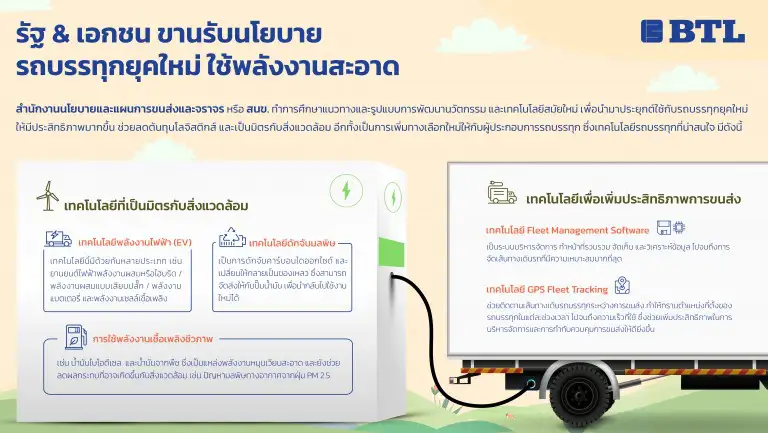Government & Private Sector Embrace New Era of Clean Energy Trucks
October, 27 2022

The Ministry of Transport has assigned the Office of Transport and Traffic Policy and Planning (OTP) to study, develop, and apply modern truck technologies that enhance safety, environmental sustainability, and operational efficiency. These technologies offer alternative solutions for trucking businesses nationwide.
Key Innovations in Truck Technology
-
Electric Vehicle (EV) Technology
- Includes Hybrid Electric Vehicles (HEV), Plug-in Hybrid Electric Vehicles (PHEV), Battery Electric Vehicles (BEV), and Fuel Cell Electric Vehicles (FCEV).
-
Carbon Capture Technology
- Captures carbon dioxide emissions from truck exhaust, converts it into liquid, and stores it in an onboard tank. This captured CO₂ can be reused at fuel stations or converted into traditional fuel.
-
Biofuel Technology
- Utilizes renewable fuels such as biodiesel from animal fats, microalgae, and plant oils—offering an eco-friendly alternative that reduces carbon emissions and is biodegradable.
Beyond truck technology, logistics efficiency is further enhanced by modern fleet management solutions, including:
-
Fleet Management Software
- Optimizes truck operations, monitors driver performance, and selects the most efficient delivery routes, reducing fuel costs and time loss.
-
GPS Fleet Tracking
- Monitors truck locations in real time, tracks delivery times, stop durations, route choices, and speeds—enhancing fleet efficiency and regulatory compliance.
Private Sector Adoption of Clean Energy Trucks
Thai Watsadu, a leading construction materials retailer, has launched EV Trucks for warehouse-to-store distribution across 21 branches nationwide. By 2023, the company plans to expand its EV truck fleet by 30 additional units to cover all regions of Thailand.
Benefits of Clean Energy Trucks for businesses:
-
Cost Efficiency
- A single battery charge allows 400 km of travel, costing only THB 3 per km, reducing fuel costs by 50% compared to diesel.
-
Lower Maintenance Costs
- EV trucks have fewer moving parts, requiring maintenance only every 10,000 km.
-
Environmental Impact Reduction
- Reduces CO₂ emissions, equivalent to planting 200 trees annually.
- Silent operation, minimizing noise pollution.
- Equipped with safety sensors to alert smaller vehicles.
The OTP hopes that these innovations and technologies will offer new opportunities for logistics businesses, enhancing fleet efficiency, reducing logistics costs, and minimizing environmental pollution.